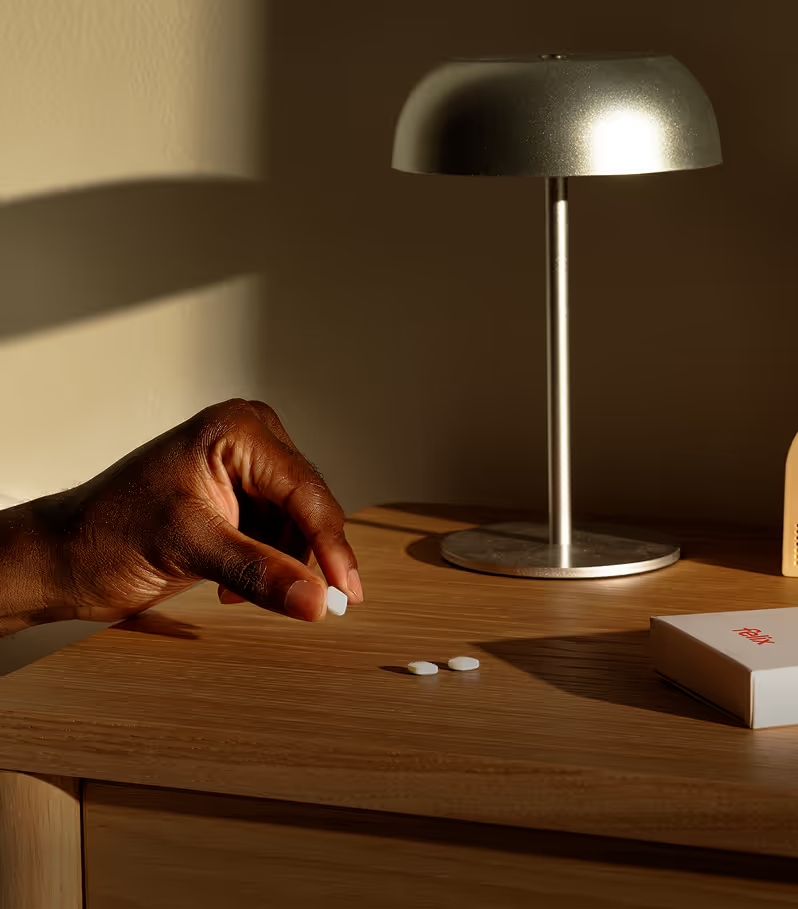Download the Felix App
Earn reward, visit our shop and get exclusive offers on the app
Download nowEarn reward, visit our shop and get exclusive offers on the app
Download nowPut your health first in 2026 with free visits on all categories, and $200 off longevity testing.
Download nowPut your health first in 2026 with free visits on all categories, and $200 off longevity testing.
Download now
AI-generated summaries may be inaccurate and do not constitute medical advice. Third-party AI tools are not under Felix's control, and your use of them is at your own risk.
Other factors such as lifestyle choices, genetics, prescription medication, and sleep quality can directly impact weight management. Yes, even sleep.
So, how many hours of sleep do you get every night?
If your answer is less than seven, you're not alone. According to a study released in 2022, more than 25% of Canadians didn't receive the recommended minimum of seven hours of sleep per night in 2020, probably as a result of the underlying stress of a global pandemic.
Sleeping and weight loss are connected. Far too many Canadians deprive themselves of sleep, unknowingly sabotaging efforts to manage their weight, or are confused by sudden, unexplained weight gain.
The amount of sleep you need daily generally comes down to age. Babies and young children can sleep up to 17 hours per night, while most adults require a minimum of seven.
Insufficient sleep can leave you feeling tired, unfocused, and maybe even a little cranky. But aside from the physical exhaustion, a lack of sleep can impact your health in other ways, too — like weight management.
A 28-year study on sleep and weight gain discovered a correlation between poor sleep and higher rates of obesity. Researchers also found that over the span of the 28-year study, subjects increasingly complained about poor sleep quality, resulting in higher rates of overall sleep loss.
The question remains — how are sleep and weight gain connected? Current research suggests that a lack of sleep and weight gain are linked to hormonal imbalances, poor decision-making, and decreased metabolism.
Prolonged sleep deprivation can lead to hormonal imbalances in your body. Ghrelin and leptin, two hormones that play a critical role in how hungry or full you feel, can lead to overeating.
When these hormones are out of balance, you may feel hungry more often, and when you do eat, you may eat more than you would because your body is slow to alert you when you're full.
Further studies have shown increased cortisol and suppressed growth hormone (GH) secretion after just six nights of poor sleep. Known as the body's stress hormone, chronically high cortisol levels can slow thyroid function and cause inflammation. Poor sleep quality can also disrupt the pattern of GH secretion, the hormone responsible for regulating fat metabolism.
Sleep is essential for optimal cognitive function. Attention, memory, and executive functions are all impaired when you don't get enough sleep, which can lead to poor decision-making.
When you're tired and not thinking straight, focusing on healthy choices can be challenging. It's much easier to hit the drive-thru or stick a frozen dinner in the oven when you're just trying to get through your day.
Low energy levels also make it hard to commit to exercise. The combination of poor decision-making brought on by cognitive impairment and a lack of energy can lead to a sedentary lifestyle and, ultimately, weight gain.
Your metabolism is responsible for all the chemical processes inside your body, including breaking down fat. When your body is in good working order, also known as homeostasis, your hormones are stable, your body grows and repairs cells as it should, and breaks down fat efficiently.
However, sleep deprivation can throw this all out of whack, disrupting homeostasis. You end up with too much of one hormone, too little of another, metabolic reactions slow down, and fat storage increases.
Establishing a healthy sleep routine is an excellent place to start if you want to lose weight. When you feel more rested, you'll have more energy for regular exercise, your cognitive function will improve, and you'll return to homeostasis.
Sleep apnea is characterized by repeated lapses of breathing during sleep. It’s a potentially serious sleep disorder affecting approximately 3% of healthy and 20% of obese people.
There's an inverse connection between sleep apnea and weight loss. And if you suffer from sleep apnea, you may notice your efforts to lose weight are futile. A critical factor to consider here is that the more you weigh, the worse your sleep apnea can get. It’s an intricate chain of reactions. Sleep apnea affects your sleep quality and can cause you to wake up frequently during the night. This, in turn, contributes to further sleep loss — something that can cause you to gain weight.
As your body weight increases, the symptoms of sleep apnea you experience can worsen, and so the cycle continues.
While there is no magical ‘best time’ to sleep for weight loss, research suggests that nighttime — the hours between dusk and dawn — is generally the best time to get restful sleep that can aid in weight loss. This isn't great news for shift workers who often suffer the highest rates of sleep disorders.
The body runs on a built-in 24-hour biological clock called the circadian rhythm. As the day rolls on, your body releases melatonin, a hormone that signals the need for sleep. Of course, everyone is different, so the release of melatonin will vary. Some people can't keep their eyes open past 9 pm, while others seem to come alive after 10 pm.
Regardless of when you like to go to bed, one thing you can do to help improve your sleep quality is to develop a consistent sleep routine. It may take some experimenting to find your perfect sleep window, but it’s worth the effort.
If you're a night owl but need to get up at 7 am for work, do your best to fall asleep by midnight so you can still hit that seven-hour sleep goal. If you don’t fall asleep the second your head hits the pillow, be sure to leave enough time from when you crawl into bed to when you fall asleep — if you know it takes roughly 30 minutes to fall asleep, hit the hay by 11:30.
Our bodies respond well to routine. Going to bed and waking up at the same time every day is an effective way to regulate melatonin release. After a couple of weeks, you'll fall asleep faster and feel more rested in the morning. However, if you continue to wake up tired, you may need more than seven hours of sleep. Try extending it to eight, and see how you feel. Again, everyone is different so finding what works best for you, your body, and your schedule should be the goal.
Current research shows a correlation between persistent poor sleep and health complications, including weight gain. If you feel your weight loss efforts have been in vain — you're gaining weight despite all your best efforts to maintain your current weight — you may want to consult a healthcare practitioner.
If you’re feeling unsure and need someone to talk to, a qualified Felix health practitioner is available to help you.
Medically reviewed by
References




























